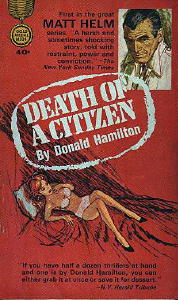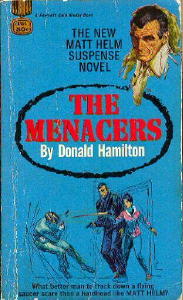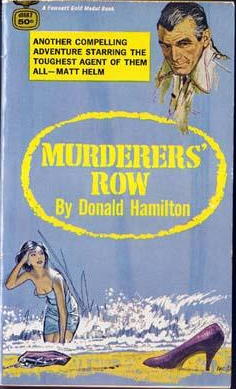|
TRAVIS
MCGEE AND MATT HELM, by Doug Bassett
“Like Travis McGee, but more completely, Helm is a voice, an ongoing voicing across three decades, commenting on things as they come up.... Like McGee (but more affirmatively) ... Helm has gone on evolving. If he didn’t, he and his creator wouldn’t have mattered so much to so many intelligent readers.”
– John Fraser, Thriller
Writers #1: Donald Hamilton
NOTE: While no endings are revealed, some twists of plot may be discovered here and there in the comparison that follows. I think Mr. Fraser is onto something with this comparison, although superficially the two characters are not similar. McGee is a freelance “salvage consultant” who works for himself on a houseboat off the coast of Florida; Helm is a spy for a super-secret Washington organization. But if you go beyond the superficial differences to the essence of the characters, you’ll find some interesting similarities that point up the qualities of a successful male adventure series from this period.  The two series debuted around the same time: Death of a Citizen in 1960; The Deep Blue Goodbye in 1964. Both Donald Hamilton and John D. MacDonald had established paperback careers prior to their series debut; both series spanned their respective creator’s lifetimes. McGee is hard to classify: he calls himself a “salvage consultant.” In practice he’s part PI, part crook, part knight-errant in the tradition of Leslie Charteris’s The Saint. Here’s an early explanation of what McGee does, from Goodbye: The more intricate our
society gets, the more semi-legal ways to steal.... And if you
take a batch of newspapers and read with great care, and read between
the lines, you can come up with a fat happy Y and a poor X wringing his
hands. I like to work on pretty good-sized ones. Expenses
are heavy. And then I can take another piece of my
retirement. Instead of retiring at sixty, I’m taking it in chunks
as I go along.
Helm is a bit easier to peg: he’s an “active spy” in the tradition of Sam Durrell (whose debut adventure, Assignment to Disaster, came out in 1955) and James Bond, of course (Casino Royale came out in America in 1958). Helm was always a particularly unsentimental variant of the breed, though: indeed, that’s an important theme throughout the series. And that made him a unique figure in the spy genre. From Citizen: “Probably,” I said. “In the strict
sense of the word. But I wasn’t competing with him in the matter
of masculinity. He may have been a better man, but he wasn’t much
of a killer.”
 Durrell and Bond and even Spillane’s Tiger Mann were all capable of violence; Hamilton always took great pains, though, to emphasize the brutal potentialities of Helm. By setting their respective characters just a bit outside of genre expectations, both MacDonald and Hamilton freed up their characters to act a voice for their personal concerns, as Fraser suggests in the quote above. One never really knew what to expect from either McGee or Helm, and thus it became believable that he might at times be a guy who philosophized. Here’s a typical late-period McGee rumination, from The Dreadful Lemon Sky: There are too many of them in the world
lately, the hopeful ladies who married grown-up boy children and soon
lost all hope.... They are not ardent libbers, yet at the same
time they are not looking for some man to “take care”. God knows
they are expert in taking care of themselves. They just want a grown-up
man to share their life with, each of them taking care. But there
are one hell of a lot more grown-up ladies than grown-up men.
And here’s a later-period Helm rumination, from The Intriguers: She was, obviously, a product of years of
television commercials, although she’d have hated anybody who told her
so. But if enough stupid industrial magnates spend enough million
dollars on tastelessly revolting advertising ... the brighter and more
rebellious ones are bound to figure out that the only sensible response
to make to all this nauseating propaganda is to be dirty and sexless.
This works only because the voice itself is so engaging, of course. That’s another similarity between the two series – the likeability of the narrative voice. I don’t think many people read the McGee’s or the Helm’s for the plot. Often there’s no doubt who did what to whom in a McGee: consider Bright Orange for the Shroud, for instance, where the cast of villains is introduced fairly early. Often the matter of who did what to whom is very confusing in a Helm, but does it really matter? It seems like everyone double- or triple-crosses each other in The Menacers, but it’s almost background noise. (And in fact the plots in both series could often be ridiculous. Consider the creepy clinic in Nightmare in Pink, for instance, or the elaborate, almost James Bond-like plot of The Devastators. It is the voice of McGee and Helm that carries us through these absurdities, through their very persuasiveness.)  We may not read for the plot, but we surely read in part for the action. Both series handle actions sequences well, of course. MacDonald is generally underrated in this respect, but he was particularly good at elaborate action set pieces, which are usually interestingly skewed in one way or another. Here’s a bit of my favorite action sequence in the McGee canon, from my favorite book in the series, The Long Lavender Look. McGee’s in a trailer with one of the bad guys – in this case a bad girl: Now, honey, we get ready for
visitors. Try the cupboards. Nothing. Nothing.
Hmm, an extension cord. Box of Kleenex. Nothing in the next
one. There now! Nice fat roll of black plastic
electrician’s tape.
There’s a wryness here I find very appealing. The stances of McGee during these sequences vary, but often there’s a feeling of foolishness lurking somewhere under the action, a feeling of self-mockery. And here’s a bit from one of the better Helm’s, Murderer’s Row: I tossed it into the car. It was
kind of pitiful, actually. They come out of training having
learned a few miraculous chops with edge of the hand, a few blows with
a magic stick, and they think they’re invulnerable and invincible.
There’s a wryness here, too, though it arises from a somewhat different effect: with McGee it’s the disjunction between what he’s doing and how he perceives it; with Helm, it’s the disjunction between what he’s doing and how others’ perceive it. The important point in common, though, is that both protagonists are separate from the action and can therefore comment upon it. (Another thing they have in common is that both sorts of wryness reflect back central themes of the series – McGee as tattered Knight Errant; Helm as a realist in a world of dreamers and fools.) Interestingly, both Hamilton and MacDonald do fairly well by their female characters, although they are not, of course, the focus of the series and their typical female characters are generally limited in scope. Hamilton specialized in women who were essentially men in skirts – think of the Russian agent Vadya, for instance, or his co-worker Lorna in The Intriguers – or idealists who need to know the score (Teddy Michaelis in Murderer’s Row, Priscilla Decker or Carol in The Menacers, although you don’t have to be a woman to be an innocent in Helm’s world). MacDonald specialized in wounded birds (Lois Atkinson in The Deep Blue Goodbye), sexual predators (Lilo Perris in The Long Lavender Look) and good-natured country girls (Cathy Kerr in The Deep Blue Goodbye).  Still, although the scope is usually limited they’re never formulaic: consider Vadya’s rather sad end in The Menacers, say, or Helm’s ex-wife in The Removers, who quickly breaks out of her “naive idealist” shell, or the rather complicated relationship between Helm and Moira in that same novel. MacDonald’s female characters generally got more interesting and believable as the series progressed – compare the rather flat Cathy Kerr with the sadder, harder Carrie Milligan of The Dreadful Lemon Sky, say, or note how he turns the formulaic “wounded bird in need of help” inside out in the underrated The Scarlet Ruse. Finally, there’s a strong current of romanticism in both series. In McGee the romanticism is pretty much up front: McGee consistently refers to himself as a “tarnished knight,” a Don Quixote figure engaged in absurd quests, but noble for all that. (Indeed, sometimes the romanticism threatens to overwhelm the story – early in the series McGee’s self-regard could get to be a little much.) With Helm the romanticism is submerged under the narrative, implied but still strong. Interestingly, Helm is not as tough as he portrays himself, not the consummate professional he pretends to be – he’s not Quiller, say, who often seems to have no existence outside of his job. Implicit in the Helm series is the notion that Helm, for all of his professionalism and toughness, is actually the higher romantic. Helm is constantly sacrificing himself to protect the illusions of others; at the same time Helm is constantly encountering idealists who, when the chips are down, disappoint him or betray him. Loyalty is in scarce supply in his world, and there’s a palpable sense of disappointment and regret in the series, a sense of someone sacrificing himself for the greater good. It’s a switchback situation that’s really quite clever: while we are brought into Helm’s world by the sense that he’s tougher and more realistic than everyone else, we are sold by Helm’s willingness to fight for the higher principle, for his search for a higher morality even within the sordid confines of his profession. I’ve reread the McGee series many times, it’s a favorite of mine. I’ve read about half the Helm’s. Taken over all, I have say the general quality of the Helm series is superior. I don’t think there’s a bad book in either series (well, if there’s a bad Helm I haven’t found it yet), but there are weak McGee’s: The Quick Red Fox comes to mind – it feels like an ill-advised stab at a “decadent” Hollywood book, and it is structured oddly, with a stifled sneeze for a climax. Even later in the series MacDonald could throw out a Cinnamon Skin, which plays unwisely with psychological explanations, I think, in contravention of everything he used to say about evil. (MacDonald typically regarded psychological explanations with skepticism, and in fact his typical villain is usually a kind of atavistic throwback – see Junior Allen in Deep Blue Goodbye, or Boo Waxwell in Bright Orange for the Shroud.) I haven’t really found a weak Helm book: some are bit sleepier than others (The Betrayers, say), even a book with as ridiculous a setup as The Devastators works, once you get into it. On the other hand, I don’t think Helm ever really matched McGee for great books. I think you can name at least a half-dozen genuinely great McGee’s, while the only Helm I would say is must-reading is the first, Death of a Citizen. I think this is because while both creators managed to depart from the standard formulas in their respective series, the Helm series is, comparatively, formula-bound.  The formula is set in Citizen: Helm is the dangerous man who uses tactics the civilized don’t approve of; at the same time Helm is the greater Romantic, constantly sacrificing himself to protect the illusions of others, constantly disappointed when others fail him. Read a bunch of Helm’s back to back and you’ll see this formula repeated over and over again. The most successful Helms, in my estimation, work because the variant of the formula hits unusually close to home. There’s The Removers, which plays like a remake of Citizen, although here the sting is worse because of some added ironies. Or there’s the great opening sequence in Murderer’s Row, where Helm has to beat up a woman. This inner disgust with what he’s doing, the refuge into professionalism and the search for a higher romanticism afterwards are all typical. Or there’s the brutal The Terrorizers, which takes “Helms as killing machine” to its logical conclusion. The best McGee’s, though, are all unique. Consider Pale Grey for Guilt, which is essentially a description of one big real estate con, or A Deadly Shade of Gold, as near as MacDonald ever got to an “epic” novel in the series, or The Long Lavender Look, which shows an unusually sardonic McGee trapped in a sort of parody of his common situation, or The Scarlet Ruse, which turns the formula inside out, or Bright Orange for the Shroud, where the sex of the “wounded bird“ is a male, this time. MacDonald was attracted to the upwardly mobile Florida town, and that setting does reappear in many of the McGee’s, but only as backdrop. There are similar towns in both Lavender and The Girl in the Plain Brown Wrapper, but the books couldn’t be more different. That’s not to say the Matt Helm books are bad: as I said, none of them are bad. What I am saying is that when you read a lot Helm books back to back (as I’ve done recently) the formulaic aspects of the series do rise to the fore. It may be inevitable, given the strictures of what Hamilton was trying to do – there may only be so many ways to structure an action-adventure spy novel. Because McGee is so detached from the world, though, he could be anywhere MacDonald needed him, doing anything MacDonald wanted. Plus, MacDonald was willing to seriously jigger with the formulas: by the time of A Deadly Shade of Gold the early experimentation was done, and MacDonald was willing to really explore where the character would take him. Which the more accessible series today? Probably Helm, but that’s a testament to the formulaic aspects of the series. Although the male action-adventure series doesn’t exist in the way it did during Helm’s heyday, we still, more or less, know what an action-adventure story about a macho spy *feels* like. We expect East vs. West, some violence, some skullduggery, a bit of sex, a rousing climax. Helm works because he’s a very good variant of the type, and in his writing Hamilton plays the conceits of the adventure spy series against itself very cleverly. But it’s still a recognizable type. The McGee stories are quite a different matter. McGee is an odd duck, no doubt about it – to use Ed Gorman’s memorable phrase, he was “a Rotarian’s fantasy of the Cool Guy.” And at his worst, mostly in the early books, he’s quite contrived, an odd bundle of Fifties morality paired with Sixties ratpack “coolness.”  Yet McGee feels real to me in a way that Helm never does. Part of that has to do with me: the very first hard-boiled crime story I ever read was The Deep Blue Goodbye, I devoured the series as a teenager, and McGee will always have a deeply personal place in my heart. But even if you take me out of it, I think McGee resonates in a way Helm simply doesn’t. The oddities that patch together McGee’s character early on – the moralistic womanizer, the knight errant outlaw, etc. – fuse together into a truly unique human being as the series progresses, so that by the time we hit The Dreadful Lemon Sky, say, we buy all of it: the houseboat, the sidekick economist, the noble purposes (by now skeptically examined). MacDonald seemed willing to explore this odd duck, push him up against his limitations, allow him to grow and develop. I like Helm, but I don’t buy him. Although Helm is realistically presented, and although the theme of the series is how “realistic” he is, he doesn’t, in the greater scheme of things, feel “realistic” to me. Adam Hall’s Quiller feels realistic to me. If such things as super-agents exist, I suspect they’re probably more or less like Quiller: essentially emotionally damaged creatures who live only for the thrill of the job. That’s not to say that Helm is badly presented, or uninteresting, or unappealing: it’s more to say that Helm is more consistent than McGee, but less ambitious, less unique. The most important thing, though, is that both series are definitely worth reading. NOTE:
This article first appeared in Mystery*File
#46, November 2004.
UPDATE: Tony Sides makes a short observation about Helm and McGee in the READERS FORUM, and Doug’s reply follows. _____________________________________ YOUR ADDITIONAL COMMENTS ARE WELCOME.
Copyright © 2004 by Steve
Lewis. All rights reserved to contributors.
Return to
the Main Page.
|